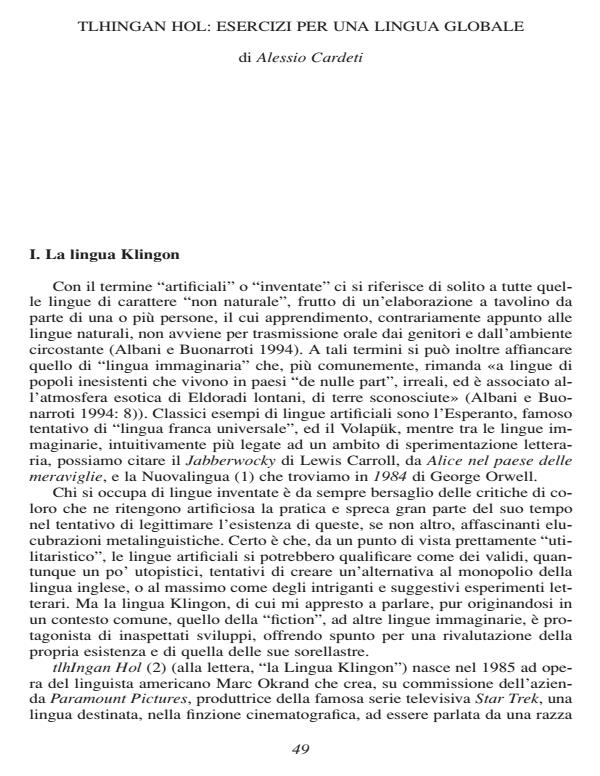TlhIngan Hol: esercizi per una lingua globale
Titolo Rivista SOCIOLOGIA DELLA COMUNICAZIONE
Autori/Curatori Alessio Cardeti
Anno di pubblicazione 2002 Fascicolo 2001/31
Lingua Italiano Numero pagine 15 P. Dimensione file 71 KB
DOI
Il DOI è il codice a barre della proprietà intellettuale: per saperne di più
clicca qui
Qui sotto puoi vedere in anteprima la prima pagina di questo articolo.
Se questo articolo ti interessa, lo puoi acquistare (e scaricare in formato pdf) seguendo le facili indicazioni per acquistare il download credit. Acquista Download Credits per scaricare questo Articolo in formato PDF

FrancoAngeli è membro della Publishers International Linking Association, Inc (PILA), associazione indipendente e non profit per facilitare (attraverso i servizi tecnologici implementati da CrossRef.org) l’accesso degli studiosi ai contenuti digitali nelle pubblicazioni professionali e scientifiche.
"Artificial" or "invented" languages are those of a "non-natural" heritage, the result of the deliberate workings of an individual or a group thereof. To these terms we could add that of "imaginary language" which commonly refers to the languages of fictional people, living in unreal, "nowhere places", evoking images of unknown lands, "distant Eldoradoes". Classic instances of artificial languages are the Esperanto and the Volapük, famous attempts for a "universally neutral language", while, among the imaginary ones, intuitively more directly connected to literary experimentation, we can find the Jabberwocky, from Lewis Carroll’s Alice in wonderland and the Newspeak, from George Orwell’s 1984. Working on such languages has always been the source of many a criticism from those who consider such practice just an artful divertissement. Surely, from a utilitarian point of view, artificial languages could be considered valid, though a bit utopian, attempts to break the international monopoly of the English language, or, at best, as intriguing literary artifices. But the Klingon language, even though originating from a context, that of fiction, common to other imaginary languages, went through some unexpected developments which offered a starting point for a revaluation of its existence and the existence of its stepsisters.
Alessio Cardeti, TlhIngan Hol: esercizi per una lingua globale in "SOCIOLOGIA DELLA COMUNICAZIONE " 31/2001, pp , DOI: